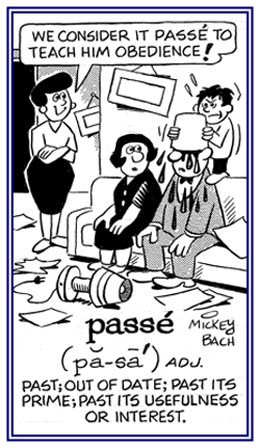You searched for:
“pass”
pass
Etymology: "to go by (something)"; also, "to cross over"; from Old French passer, from Vulgar Latiln passare "to step, to walk, to pass"; from Latin passus, "step, pace".
This entry is located in the following unit:
pass-, pace-
(page 2)
passé, passe; posse
passé, passe (pah SAY) (adjective)
1. Concerning something which is no longer current or in fashion; out-of-date: That style of music is now considered passé or passe.
2. Regarding an item which is past its prime, faded, or aged: The clothes Ben wears these days are passé.
2. Regarding an item which is past its prime, faded, or aged: The clothes Ben wears these days are passé.
posse (PAH si) (noun)
Historically, a group of people who were gathered together by a sheriff to help search for a criminal: The sheriff and his posse rode out to look for the bank robbers.
The concept of a sheriff and an armed posse maintaining law-and-order is now considered passé and is no longer a popular TV theme.
This entry is located in the following unit:
Confusing Words Clarified: Group P; Homonyms, Homophones, Homographs, Synonyms, Polysemes, etc. +
(page 2)
(Latin: miscarry, pass away, perish by an untimely birth)
(Latin: opening or passageway in the body, bodily opening or canal; or to go, to pass; a passage)
(Latin: stretch, stretching; spread, spreading)
(Latin: step, stepping)
(Latin: suffering, feeling; enduring)
(Latin: penetrare, penetratus, to go into, to enter, to pierce; to pass through, to pass into; a place within)
Word Entries containing the term:
“pass”
Unit Test, Pass (Sensory) Words
Sensory Words, Quiz #1.
Unit Test, Pass (Sensory) Words
Sensory Words, Quiz.
Word Entries at Get Words:
“pass”
passé, passe (adjective); more passé, more passe; most passé, most passe
1. Pertaining to being no longer current or in fashion: The kind of musical presentations that were played years ago are now considered to be passé renditions now.
2. Etymology: from the French verb passer, "to pass"; so, it literally means "passed".

© ALL rights are reserved.
Go to this Word A Day Revisited Index
2. Etymology: from the French verb passer, "to pass"; so, it literally means "passed".

Go to this Word A Day Revisited Index
so you can see more of Mickey Bach's cartoons.
This entry is located in the following unit:
Words of French origin
(page 7)
